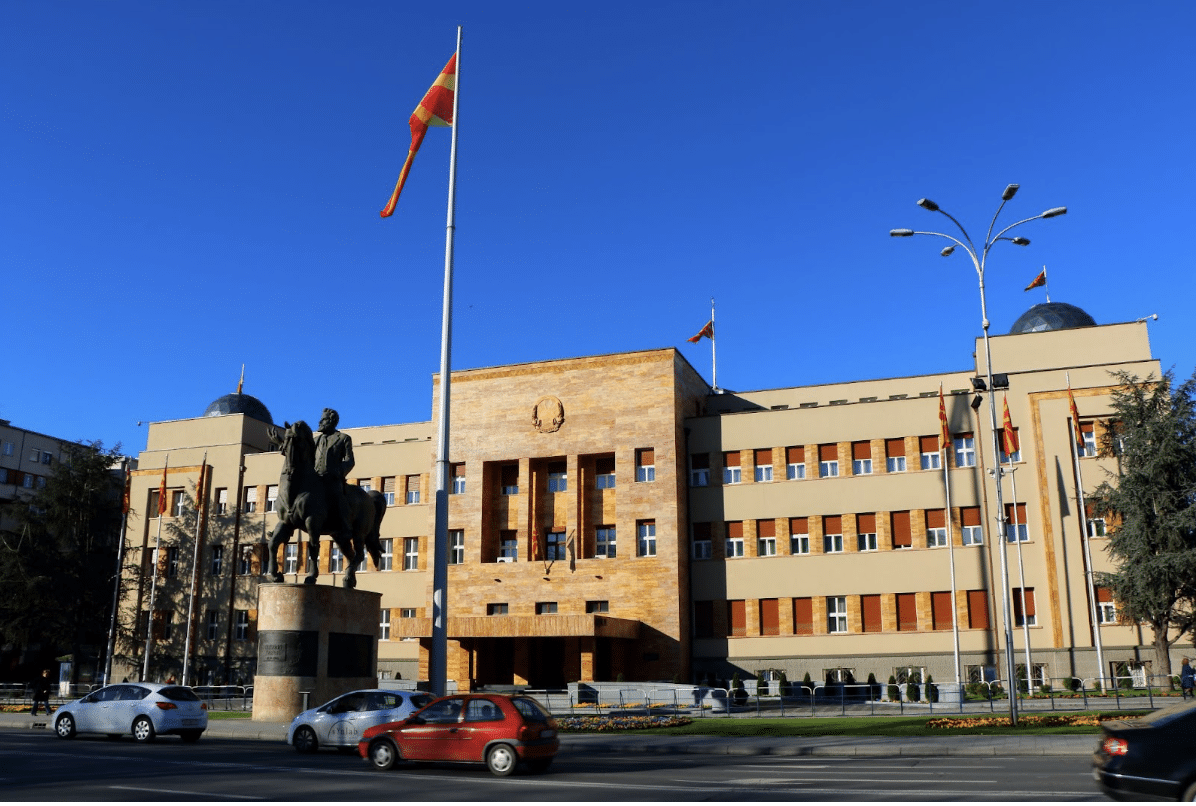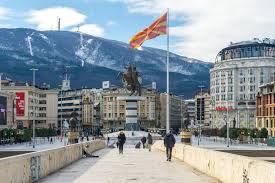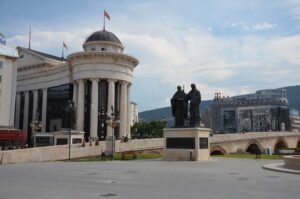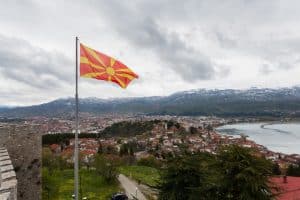Photo: The Parliament of North Macedonia, Wikimedia Commons
On the 18th of August, North Macedonia’s Parliament started ten days of debate on a constitutional change that would pave the way for the country’s EU accession. The required two-third majority of MPs for the bill to pass, has not yet been reached. Instead, the main opposition party has called for new elections and the resignation of several ministers. This causes the government, led by the socialdemocratic SDSM party, to be under serious pressure, especially as new elections are likely to result in a right-wing government. Furthermore, if the bill does not pass, the country’s EU accession talks are likely to be halted. This article answers four important questions about the current tensions in North Macedonia.
Why are constitutional changes required for North Macedonia’s EU accession?
North Macedonia’s path towards EU accession has always been complicated by Bulgarian efforts, due to the historic disputes about ethnic and linguistic matters between the two countries: Bulgaria claims that North Macedonia’s language and identity are of Bulgarian origin, which Macedonians consider offensive. Furthermore, disputes concern the Bulgarian minority in North Macedonia and vice versa. Earlier, before the EU opened accession talks with North Macedonia began in July, Bulgaria had blocked these talks from happening, until North Macedonia accepted the “French Proposal”, which meant that the Bulgarian minority would be acknowledged in the Macedonian constitution, alongside their rights being constitutionally protected.
Now, Bulgaria is demanding that Bulgarians be named as North Macedonia’s founding peoples in the constitution, in order for EU accession talks not being stalled by a Bulgarian veto. For this constitutional amendment to be made, a two-thirds majority in Parliament is required. This means that 80 out of 120 MPs have to be in favour of including Bulgarians as North Macedonia’s founding peoples. However, it seems that this majority will not be reached due to the controversy the constitutional changes have sparked.
What makes the constitutional changes controversial?
Giving in to Bulgeria’s demands has repeatedly led to controversy in North Macedonia. In July 2022, the acceptance of the French Proposal, led to daily protests. These were organised by eurosceptic and right-wing opposition party VMRO-DPMNE and condemned the so-called “Bulgarisation” of Macedonian society as a condition for entry into the EU. Now, the opposition party is strongly resisting the newly proposed constitutional change of adding Bulgaria to North Macedonia’s founding peoples.
The reason why the constitutional changes are perceived with such discontent, is North Macedonia’s recent surge in right-wing, nationalist, and anti-Bulgarian sentiment, following the French Proposal. The threats which the constitutional changes are believed to bring to North Macedonia’s national interest, seem to be coming from Russian-fueled myths rather than realistic expectations. Russia has sought to strategically provoke the tensions between Sofia and Skopje and has had a significant role in stirring up anti-Bulgarian hysteria and protests in North-Macedonia. Furthermore, VMRO-DPMNE is claimed to work together with the Kremlin, in order to intervene in Macedonian domestic politics, with the goal of preventing the country from joining the EU.
What did the run-up to the debate look like?
Given the high urgency of the constitutional changes on the one hand, and the fierce opposition on the other hand, the debate on the constitutional amendments was preceded by many attempts to make VMRO-DPMNE vote in favour. The right-wing party had set many criteria for this to happen. It announced that it would only vote in favour if the left-wing, pro-European, and ethnic Albanian DUI party resigned from government, which it did. However, the resignation of DUI ministers will only become effective once VMRO-DPMNE votes for the amendments, while VMRO-DPMNE demands the resignations to be irrevocable. Furthermore, the party also insists early parliamentary elections be held this fall. The party said that it has stopped all meetings with the government, except for those concerning snap elections. In addition, VMRO-DPMNE has added a new criterion for voting in favour of the constitutional amendments: for the SDSM ministers to resign as well. The party has also set conditions for actors outside of the Macedonian government. It has called for the EU to “unequivocally confirm Macedonian identity, culture, tradition and language” and for Bulgaria to recognise a Macedonian minority in the country. In other words, it is obvious that VMRO-DPMNE was never intending to vote in favour of the constitutional amendments, by continuing to set new conditions, some of which it knew would not be met.
What will happen after the debate?
As VMRO-DPMNE has, unsurprisingly, not considered their criteria being reached, they are still not in favour of the constitutional changes. So far, during the debates, it has thus become clear that there is a shortage, namely of 7 MPs, in order for there to be a two-thirds majority. If this stays the same, this means that VMRO-DPMNE has successfully managed to block the constitutional changes, and that Bulgaria will continue its veto on accession talks with the EU.
With this in mind, the government might decide to postpone the vote to November, which is closer to the scheduled continuation of the EU accession talks and would thus bring more pressure on the opposition to stop hindering the process. However, the government might also feel forced to agree with the VMRO-DPMNE’s demands to hold early elections.
No matter when Macedonians will go to the polls, either next fall in snap elections, or next spring when elections are officially scheduled, the increase in nationalist sentiment is likely to make the socialdemocratic SDSM party suffer from an electoral defeat while bringing the VMRO-DPMNE party to power. These results, which are also predicted by polls, spark concerns about the future of North Macedonia’s path towards EU accession. With the eurosceptic VMRO-DPMNE party with its links with Russia in government, the country is unlikely to implement the required reforms for entering the EU. Therefore, the VMRO-DPMNE party does not have much good in store for the future of the country.
Written by Luna Sent



